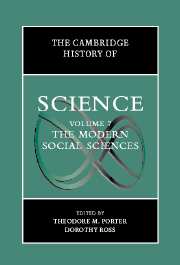Book contents
- Frontmatter
- 1 Introduction: Writing the History of Social Science
- PART I SCIENCES OF THE SOCIAL TO THE LATE NINETEENTH CENTURY
- PART II THE DISCIPLINES IN WESTERN EUROPE AND NORTH AMERICA SINCE ABOUT 1880
- PART III THE INTERNATIONALIZATION OF THE SOCIAL SCIENCES
- 22 The Sciences of Modernity in a Disparate World
- 23 The Social Sciences in Latin America during the Twentieth Century
- 24 Psychology in Russia and Central and Eastern Europe
- 25 Sociology in Egypt and Morocco
- 26 The Social Sciences in Africa
- 27 The Social Sciences in India
- 28 The Social Sciences In China
- 29 The Social Sciences in Japan
- PART IV SOCIAL SCIENCE AS DISCOURSE AND PRACTICE IN PUBLIC AND PRIVATE LIFE
- Index
- References
24 - Psychology in Russia and Central and Eastern Europe
from PART III - THE INTERNATIONALIZATION OF THE SOCIAL SCIENCES
Published online by Cambridge University Press: 28 March 2008
- Frontmatter
- 1 Introduction: Writing the History of Social Science
- PART I SCIENCES OF THE SOCIAL TO THE LATE NINETEENTH CENTURY
- PART II THE DISCIPLINES IN WESTERN EUROPE AND NORTH AMERICA SINCE ABOUT 1880
- PART III THE INTERNATIONALIZATION OF THE SOCIAL SCIENCES
- 22 The Sciences of Modernity in a Disparate World
- 23 The Social Sciences in Latin America during the Twentieth Century
- 24 Psychology in Russia and Central and Eastern Europe
- 25 Sociology in Egypt and Morocco
- 26 The Social Sciences in Africa
- 27 The Social Sciences in India
- 28 The Social Sciences In China
- 29 The Social Sciences in Japan
- PART IV SOCIAL SCIENCE AS DISCOURSE AND PRACTICE IN PUBLIC AND PRIVATE LIFE
- Index
- References
Summary
If we assume, as many scholars do, that psychology is mainly European in origin and appeared as a special scientific discipline during the second half of the nineteenth century, we may ask how specific national contexts have affected the discipline’s development. Have the particular social and cultural contexts of Russia and central and eastern Europe, for instance, fostered any original developments in psychology? Can we say, as one historian has recently claimed, that there was a specific “Russian way” in the human sciences? What are the results for the human sciences of the “communist experiment” in the Soviet Union and other socialist countries? Did the Iron Curtain that separated the communist countries from the West for several decades create a “splendid isolation,” in which psychology proliferated unencumbered by controversies that surrounded the discipline elsewhere? Or did this situation produce a cultural and academic enclave that fostered parochial tendencies and hindered the discipline’s development?
Unambiguous answers to these questions are impossible to provide. On the one hand, in Russia after 1917 and in some eastern and central European countries after World War II, political pressures gave a particular twist to local psychological research. On the other hand, there were many conceptual developments in these countries that deserve close attention. There also were intense theoretical debates, of relevance for Western psychology, on questions of psychology’s relationship to philosophy and to physiology, the interaction between psychological theory and practice, and the remodeling of human nature.
- Type
- Chapter
- Information
- The Cambridge History of Science , pp. 431 - 449Publisher: Cambridge University PressPrint publication year: 2003
References
- 5
- Cited by



